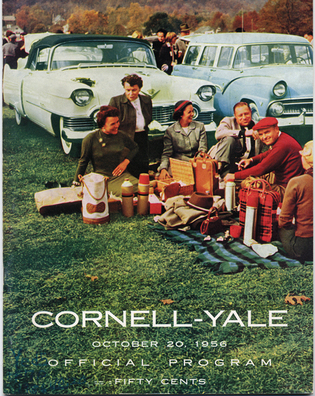 loading
loading
Old YaleTailgating: a century of feasting al fresco Manuscript & ArchivesBy the 1950s, as this football program attests, pregame picnics were enshrined in Yale fan tradition. View full image
According to the late Yale football historian Thomas Bergin ’25, ’29PhD, tailgating may well have begun at Yale. (Football history was a sideline for Professor Bergin, an eminent scholar of Italian literature at Yale.) In his 1984 book The Game, Bergin explained that “the first recorded evidence”—he found it in the New York Times—places the beginning of “the now ritualistic tailgate preliminaries” at Yale Field, on November 24, 1906. For Yale football, 1906 was an exemplary season. With football great Walter Camp ’80 as advisory coach, the Blue ended the season with one tie, no losses, and nine wins, including a 6–0 win over Harvard. It was at the Harvard game that tailgating was first recorded, though it was not yet called by that name. Thousands of spectators took the train to New Haven for the two o’clock game, and many had to walk to the field:
Professor Bergin did find some earlier references to pregame refreshments—so early that the food might have been consumed atop horse-drawn carriages, which were often lined up along one or two sides of the field. But the defining feature of tailgating, besides food, is the automobile. By the year 1905, the United States was on the cusp of its automotive future, with about 78,000 cars in use in the nation. Many of those early vehicles had been manufactured in the Northeast, and it is likely that a large percentage of the nation’s cars in 1906 were driven to New Haven on November 24 for the Harvard game. “A constant stream of automobiles” poured in that day, the Times noted. “The open fields about the grounds were simply black with machines parked together in such a hopeless mass as to make it seem impossible for one ever to find his own once more.” For years, the pregame parties were described in the papers simply as “parking lot picnics.” Then, in the 1930s, as wooden-sided station wagons became prestigious, picnic fare began to be served buffet-style on the lowered tailgate. In the 1950s the family vehicle of choice was the station wagon, usually a Ford Country Squire, Chevy Suburban, or the upscale Chrysler Town and Country. This was the era when the term tailgating was coined. The first citation of the new meaning of tailgate in the online Oxford English Dictionary is from the Toronto Globe and Mail, in 1970. But there are earlier US citations. The first mention of Yale and tailgating in the New York Times was in 1961, when a sportswriter looked forward to the appearance of “next fall’s tailgate picnics on hallowed grounds.” James Beard’s Treasury of Outdoor Cooking (1960) features a “Tailgate picnic for four” menu: chicken paella, crisp green salad, blue cheese, French bread, and beer. (My own family cookbook collection includes a 1959 “Tailgate Buffet for eight.”) For the Hartford Courant’s article on the 100th Yale-Harvard game, in 1983, a reporter wrote to a number of “famous Yale alumni” requesting their favorite tailgate recipes. The sole contribution was from then–Vice President George H. W. Bush ’48, who offered a layered vegetable salad and lemon bars. Since those days, tailgating has become a national institution. For many college students, the term has come to imply a drinking party—the first definition in the Urban Dictionary. But for alumni, tailgating is often a gourmet extravaganza. As Tom Bergin wrote more than 25 years ago: “Today tailgating can be a Lucullan exercise; it is no longer a martini and a sandwich but a lavish production with substantial courses and not infrequently served on folding tables, complete with napery and glittering silver. Some zealous practitioners have been known to miss the first quarter of the game, reluctant to abandon the conviviality of the overture.”
The comment period has expired.
|
|